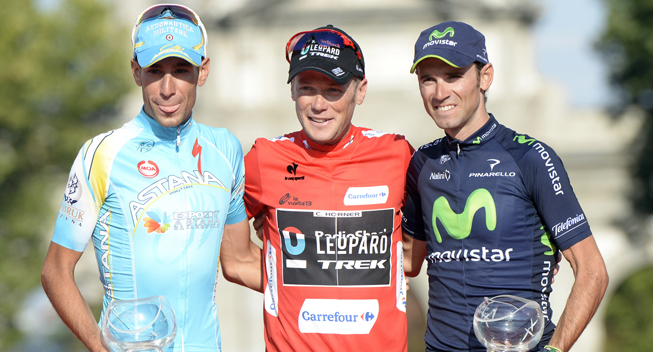Earlier this week the provisional start list for the Vuelta a Espana was released by organizers Unipublic and the 2014 edition shapes up to be one of the most competitive in recent years. Race director Javier Guillen is pleased with the field and gives a description of the key points of the course.
Vuelta a España general director Javier Guillén is happy to announce that almost all the world’s best cyclists have entered the race set to kick off on August 23 in Jerez de la Frontera in the south of Spain and finish in Santiago de Compostela in the north west on September 14. In 2015, the event will celebrate its 80th anniversary but the 2014 Vuelta a España is already going to offer a spectacular show.
Javier Guillén, the start list looks exceptional. What’s your comment?
It is indeed, even though teams can modify their line up until four days prior to the start. In addition to what we already knew from the enrolment forms we received, the very good news came on Tuesday with Alberto Contador possibly taking part. He’s been on the list of titular riders sent to us by Tinkoff-Saxo a few days ago. Since he crashed at the Tour de France, I’ve been hoping for a quick recovery. Shall he be able to take part in the Vuelta, he’d enrich an already exceptional start list [Note: Contador's manager has now definitively ruled out the participation]
Does this start list make the Vuelta the second Grand Tour in your mind?
For me, it’s the first! Of course, the Tour de France is the world’s biggest yearly sport event, not only in cycling, but the Vuelta keeps improving year after year.
Can you describe the course with two distinctive parts, one in the south and one in the north?
It’s going to be very hot in the south, let’s say the weather will be better than in France in July… As usual, we’ll start with a team time trial. We’ve opted for shorter stages. The longest one will be stage 8 from Baeza to Albecete (207km) in order to bridge the south and the north of the country. Last year we had a mountain stage on day 3, this time the first one will be stage 6 to La Zubia but the route before that isn’t dead flat. There’ll be some spectacle, notably on stage 4 with a climb situated 25km before the finish in Cordoba.
Are the mountains mostly scheduled in the second part?
Yes, real climbing will begin the day after the [34.5km long] individual time trial in Borja. There will be three high mountain stages: stage 15 to Lagos de Covadonga, stage 16 to La Farrapona, which I believe to be the queen stage, and the second last stage to los Ancares. Besides that, there are about ten medium mountain stages including a very nice course from Pamplona to San Miguel de Aralar (stage 11). There are eight uphill finishes. That’s the trademark of La Vuelta.
Every year you come up with a spectacular location like the Pamplona arena for a team time trial two years ago. What’s new this time?
The start of stage 3 in Cadiz will take place on the deck of an aircraft carrier. That has never happened in cycling before!
How come won’t the Vuelta finish in Madrid?
Santiago de Compostela celebrates the 800th anniversary of the visit of Saint Francisco of Assisi. Such an exceptional occasion was needed for skipping Madrid where we’ll go back next year for sure. It was also a way to thank Galicia and its elected members for having hosted the Grand Depart in 2013. The finishing line of the closing individual time trial will be drawn at the exact end of the pilgrimage walk. The last rider will arrive at nightfall. The award ceremony will be a spectacular one.
Isn’t it difficult to name a hot favorite for the Vuelta this year?
I’ll make four names: Nairo Quintana, Chris Froome, Alejandro Valverde and Joaquim Rodriguez. But we shouldn’t forget Cadel Evans, Warren Barguil who’s got a huge talent, and of course, Alberto Contador if he’s here.
| Sterre VERVLOET 21 years | today |
| Juliette LAROSE GINGRAS 22 years | today |
| Aaron GATE 34 years | today |
| Stephen O'SULLIVAN 50 years | today |
| Eslam AHMED 30 years | today |
© CyclingQuotes.com









